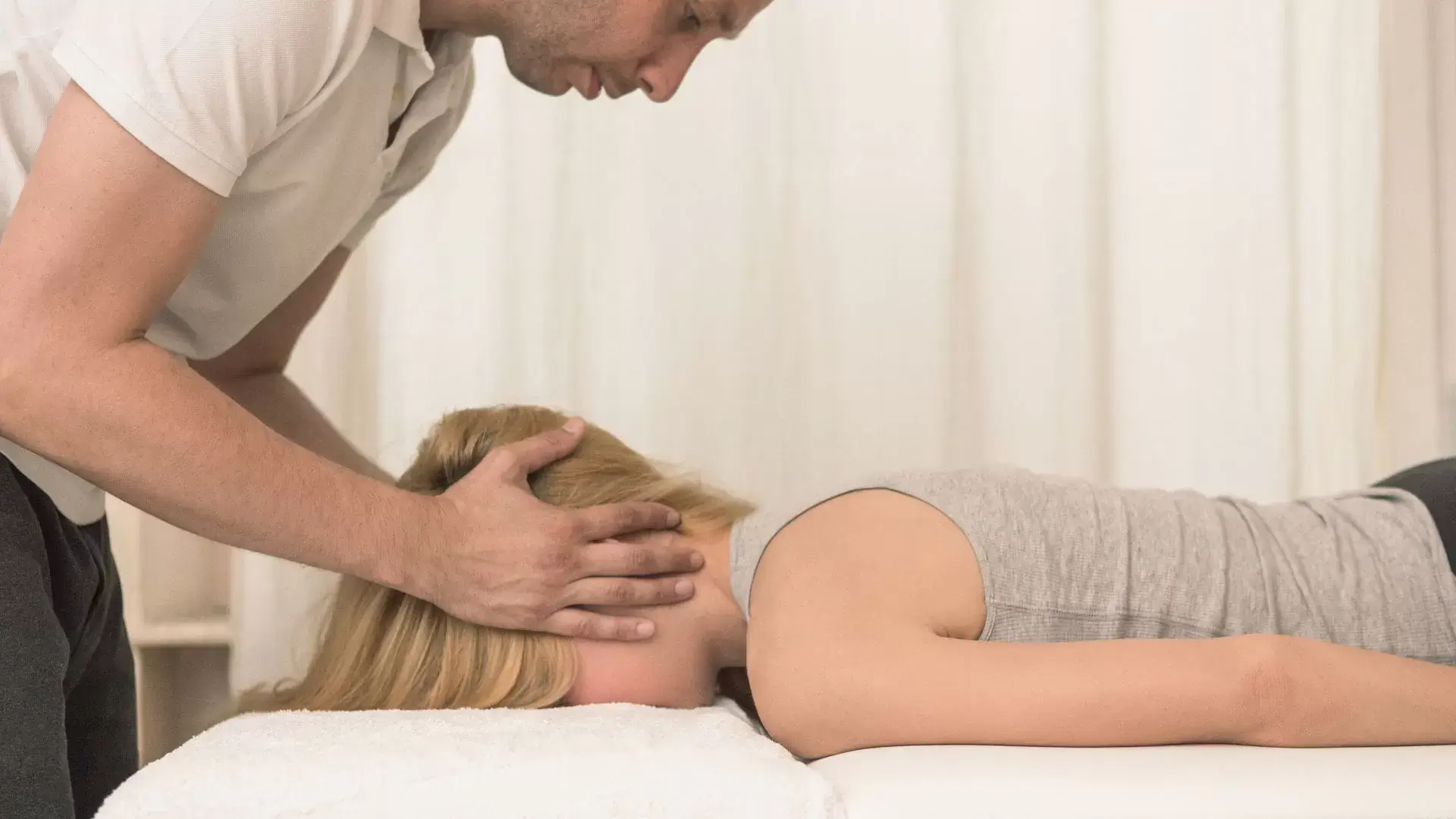We recognize the importance of accessing specialized chiropractic care for concussion recovery in Mississauga. Our dedicated team employs evidence-based techniques to address neck pain, headaches, and balance issues resulting from concussions. We create personalized treatment plans focused on your unique recovery needs, incorporating gentle adjustments and vestibular therapy. Early intervention is crucial for effective healing, and we’re committed to supporting your journey back to peak health. By exploring our services, you’ll discover extensive strategies that promote brain healing and resilience against future injuries.

At Mississauga Physio Chiro Clinic, we offer extensive physiotherapy and chiropractic services tailored to address the unique needs of each patient, including those recovering from concussions. Our approach is evidence-based and focuses on the complexities of traumatic brain injuries, such as post-concussion syndrome. We recognize that symptoms like dizziness and headaches can greatly impact daily life, which is why we provide thorough headache management strategies alongside our core services.
Our Best Physiotherapy & Chiropractic Clinic in Mississauga specializes in balance therapy and cognitive therapy to enhance recovery timelines and optimize neurorehabilitation. Through personalized assessment, we identify specific challenges each patient faces and develop targeted treatment plans to address them.
We prioritize a patient-centered approach, ensuring that our physiotherapy and chiropractic services integrate seamlessly to promote overall well-being. By collaborating closely with each individual, we aim to empower them on their journey to recovery. Our goal is to not only alleviate symptoms but also to restore function and improve quality of life after a concussion. With our expert guidance, patients can navigate their recovery process with confidence and clarity.
Understanding concussions is fundamental for recognizing their causes and the significant impact they can have on brain health and overall well-being. A concussion is categorized as a mild traumatic brain injury, often resulting from a head injury, particularly in sports-related activities. It’s important to note that a concussion can occur without a loss of consciousness, making awareness of symptoms essential.
The impact of a concussion extends beyond immediate symptoms, affecting neurocognitive function and potentially leading to vestibular dysfunction. This is why following a structured concussion protocol is fundamental for effective recovery. Post-injury rehabilitation often involves physical therapy for concussion, which helps individuals regain strength, balance, and cognitive function.
Neurocognitive testing is also an important tool in evaluating recovery and determining when it’s safe to return to daily activities or sports. We must prioritize brain health by understanding the risks associated with concussions and ensuring proper evaluation and treatment. By doing so, we can help mitigate the long-term effects of these injuries and support ideal recovery for those affected.
Recognizing concussion symptoms is fundamental for our health, as timely intervention can greatly influence recovery outcomes. When we experience head trauma, common concussion symptoms may include confusion, amnesia, dizziness after head injury, and visual disturbances. It’s important to be aware of these signs and understand that they can manifest differently in each individual.
If we or someone we are familiar with displays these symptoms, seeking help promptly is essential. A concussion is a type of brain injury, and addressing it early can prevent further complications and facilitate a smoother recovery. Following return-to-play guidelines is particularly important for athletes, as returning too soon can exacerbate the injury.
Occupational therapy can also play a key role in our recovery process, helping us regain cognitive and physical function. After a concussion, a gradual return to activity is recommended, allowing our brain time to heal properly. By staying vigilant and informed about concussion symptoms, we can guarantee our safety and well-being, as well as that of our loved ones. If we’re ever in doubt, consulting a healthcare professional is always the best course of action.
After identifying concussion symptoms and seeking appropriate medical help, exploring chiropractic care can be a valuable component of our recovery process. A chiropractor specializes in treating various aspects of concussion recovery, including neck pain, post-traumatic headaches, and balance problems. They often employ vestibular therapy to address dizziness and cognitive impairment, which can considerably impact our daily lives.
Chiropractic adjustments may help restore proper alignment, relieving tension and reducing discomfort. Additionally, chiropractors can provide guidance on hydration and nutrition, emphasizing the importance of omega-3 for brain health, which supports cognitive function and overall recovery.
As we navigate our return-to-work program, chiropractic care can play an essential role in helping us regain our strength and stability. By addressing both physical and cognitive challenges, we can work towards a more thorough recovery. Through personalized treatment plans, chiropractors focus on our specific needs, ensuring we feel supported throughout our journey.

Whiplash and cervical spine issues are common complications following a concussion, often leading to persistent discomfort and mobility challenges that can hinder our recovery process. We understand that many individuals experience not just neck pain but also headaches, dizziness, blurred vision, and coordination issues as a result of these injuries. Sensitivity to light may also accompany these symptoms, further complicating our day-to-day activities.
Chiropractic treatment can play an essential role in addressing these complications. Through targeted therapies, we can help restore proper alignment in the cervical spine, alleviating tension and promoting healing. Gentle adjustments aim to improve mobility and reduce pain, making it easier for us to manage our symptoms.
Additionally, chiropractic care can enhance nervous system functioning, which may help mitigate issues like dizziness and coordination problems. As we navigate our recovery journey, it’s important to work closely with our chiropractor to develop a personalized treatment plan that addresses our unique needs. By focusing on both the whiplash and concussion aspects, we can optimize our healing and regain the quality of life we deserve.
Following the challenges of managing whiplash and cervical spine issues, many of us also face the debilitating effects of post-traumatic headaches, which can greatly impact our daily functioning and overall well-being. These headaches often arise after a concussion or brain trauma, and they may be accompanied by symptoms like memory loss, nausea, dizziness, fatigue, sleep disturbances, and emotional instability.
To alleviate these issues, we can turn to various chiropractic techniques specifically designed to address post-traumatic headaches. Gentle spinal adjustments can enhance alignment and reduce tension in the cervical spine, potentially alleviating headache symptoms. Additionally, soft tissue therapies can help release muscle tightness that may contribute to headache pain.
Moreover, we may benefit from therapeutic exercises that focus on strengthening the neck and improving posture, which can further reduce headache frequency and intensity. By integrating these chiropractic techniques into our recovery plan, we can promote healing following a concussion and improve our quality of life. It is crucial to work closely with our chiropractor, ensuring our treatment is tailored to our individual symptoms and needs, allowing us to regain control over our health.
Many individuals recovering from a concussion experience dizziness and balance issues, making vestibular therapy an essential component of their rehabilitation journey. At our clinic located at 1834 Lakeshore Rd W unit 6C, Mississauga, ON L5J 1J7, we recognize the challenges that come with inner ear dysfunction and vertigo. Vestibular therapy focuses on restoring balance and reducing dizziness through targeted exercises and techniques tailored to each patient’s needs.
Dizziness can notably impact daily activities and quality of life, particularly for those with sensitivity to noise. Our trained professionals work collaboratively with patients, including those dealing with pediatric concussions, to develop individualized plans that address their unique symptoms. Through thorough assessments, we identify the specific vestibular deficits and implement effective strategies to improve balance and coordination.
Supporting cognitive function and mental clarity after a concussion is crucial for a patient’s overall recovery and return to daily activities. Many individuals experience symptoms such as difficulty concentrating, brain fog, and delayed reaction time following a traumatic brain injury (TBI) or diffuse axonal injury. These cognitive impairments can greatly impact daily life and overall well-being.
As healthcare providers, we recognize that mood swings, anxiety, and depression often accompany these cognitive challenges. Addressing these emotional aspects is essential, as they can further hinder recovery. Our approach focuses on a thorough treatment plan that targets both cognitive function and emotional health.
We use evidence-based strategies, including cognitive rehabilitation exercises, to help improve attention, memory, and processing speed. Additionally, we encourage lifestyle modifications, such as maintaining a balanced diet, engaging in regular physical activity, and practicing mindfulness techniques, to support mental clarity.

Chiropractic care can play an important role in enhancing sleep quality and reducing fatigue, especially for individuals recovering from a concussion. Many of us experience insomnia and fatigue as a result of concussion-related symptoms such as photophobia, phonophobia, and difficulty focusing. These issues can stem from brain swelling or even lead to more severe conditions like second impact syndrome or chronic traumatic encephalopathy if not addressed.
Through targeted chiropractic adjustments, we can alleviate tension in the nervous system, which may help regulate sleep patterns and promote relaxation. By addressing the underlying musculoskeletal issues that contribute to our discomfort, we create an environment conducive to better sleep. Additionally, chiropractic care can enhance blood flow, potentially reducing inflammation and aiding in faster recovery, which is essential for those of us facing the lingering effects of a concussion.
Furthermore, regular chiropractic sessions can assist in managing overall stress levels, which is important for restoring our energy and combating fatigue. By prioritizing our sleep and addressing these symptoms with chiropractic care, we can take significant steps towards recovery and improved quality of life post-concussion.
How can we effectively manage the mood swings, anxiety, and depression that often accompany a concussion? After experiencing a workplace concussion or a motor vehicle accident concussion, it’s important to recognize the emotional challenges that may arise, including irritability and heightened anxiety. Understanding our baseline through concussion testing can guide our recovery journey.
Utilizing a multidisciplinary approach is significant. Cognitive-behavioral therapy (CBT) has proven effective in addressing mood disturbances post-concussion, helping us develop coping strategies. Additionally, considering the impact of repeated head injuries on our mental health is essential. Functional MRI studies indicate that concussion can alter brain function, leading to emotional dysregulation.
Incorporating lifestyle changes can also aid in managing these symptoms. Limiting exposure to blue light, particularly before bedtime, can improve our overall mental well-being. Regular physical activity and mindfulness practices may help alleviate depression and anxiety, fostering a more positive outlook.
Ultimately, addressing mood swings and anxiety post-concussion requires a thoughtful, patient-centered approach. We must be proactive in seeking support and utilizing available resources to facilitate our emotional recovery. Together, we can navigate the complexities of post-concussion recovery more effectively.
Following the emotional challenges we face post-concussion, it’s important to also recognize the potential for visual disturbances and neurological health issues that can emerge after head trauma. Symptoms like double vision, slurred speech, and delayed recall can greatly impact daily life and recovery. These issues may arise from a coup-contrecoup injury, where the brain is injured on both sides due to rapid movement.
For those experiencing these symptoms, it’s essential to seek a thorough evaluation. A CT scan for concussion can help identify any structural damage, while impact testing assesses cognitive function. If we notice persistent symptoms like vomiting or difficulty with coordination, we should consult a healthcare professional.
In our journey towards recovery, addressing these visual and neurological disturbances is fundamental. Chiropractic care can play an important role in alleviating symptoms and supporting overall neurological health, especially when combined with targeted rehabilitation strategies. If you’re experiencing any concerning symptoms, don’t hesitate to contact us for guidance and support. Together, we can navigate the complexities of concussion recovery and work towards regaining our health.
Ensuring a safe return-to-play and return-to-work strategy is essential for individuals recovering from a concussion, and chiropractic support can greatly enhance this process. We recognize that each recovery journey is unique, and our approach is tailored to meet individual needs. By evaluating the patient’s physical condition and symptoms, we can create an extensive plan that prioritizes safety and well-being.
Chiropractic care focuses on restoring proper alignment and function of the spine and nervous system, which can be vital during recovery. We employ rehabilitation exercises, manual therapies, and neurological assessments to monitor progress and readiness for returning to activities. These strategies not only help alleviate symptoms but also facilitate a gradual reintegration into physical and occupational demands.
Moreover, we emphasize communication with other healthcare providers, ensuring a multidisciplinary approach to recovery. This collaboration helps us to establish appropriate benchmarks for return-to-play and return-to-work, minimizing the risk of re-injury. By working together, we can support our patients in steering their recovery while promoting ideal health and performance post-concussion. Ultimately, our goal is to empower individuals to regain confidence in their abilities and safely shift back to their activities.
In addition to tailored return-to-play and return-to-work strategies, enhancing brain healing after a concussion greatly benefits from proper nutrition and hydration. We recognize that the brain requires specific nutrients to recover effectively. Incorporating a balanced diet rich in antioxidants, omega-3 fatty acids, and vitamins B, D, and E can support cognitive function and reduce inflammation. Foods such as leafy greens, fatty fish, nuts, and seeds should be prioritized.
Hydration also plays a vital role in the healing process. Staying well-hydrated helps maintain ideal blood flow, ensuring that necessary nutrients reach the brain. We recommend drinking sufficient water daily and considering electrolyte-rich beverages if needed, especially for those experiencing headaches or fatigue.
Moreover, we encourage our patients to avoid processed foods, excessive sugar, and alcohol, as these can exacerbate symptoms and hinder recovery. By focusing on a nutrient-dense diet and adequate hydration, we can create an environment conducive to brain healing. It’s important to remember that recovery is a journey, and with the right support in nutrition and hydration, we can enhance our overall well-being and cognitive health post-concussion.
To effectively prevent future injuries, we must implement long-term rehabilitation strategies that focus on strength, balance, and coordination training tailored to each patient’s unique needs. Research shows that a thorough rehabilitation program can greatly reduce the risk of subsequent concussions and other related injuries.
We begin by evaluating each patient’s physical capabilities and limitations. This personalized approach allows us to design a program that emphasizes core stability, proprioception, and neuromuscular control. By integrating exercises that challenge balance, such as single-leg stands and dynamic movements, we can enhance our patients’ overall stability and body awareness.
Additionally, incorporating resistance training can bolster muscle strength, particularly in the neck and upper body, which plays an essential role in mitigating the impact forces during physical activities. Regular evaluations help us monitor progress and adjust the rehabilitation plan accordingly, ensuring that we’re meeting our patients’ evolving needs.
Ultimately, our goal is to empower patients with the tools and knowledge to maintain their physical health post-recovery. By committing to these long-term strategies, we’re not just addressing immediate concerns; we’re fostering resilience against future injuries, allowing our patients to engage confidently in their daily activities and sports.
Booking a consultation for chiropractic concussion treatment in Mississauga allows us to assess your unique situation and develop a tailored recovery plan that addresses your specific needs. Our experienced chiropractors will begin by conducting a thorough evaluation, including a detailed medical history and physical examination. This process helps us understand the impact of your concussion on your overall health and well-being.
During this initial consultation, we’ll also discuss your symptoms, lifestyle, and any previous treatments you’ve undergone. This information is essential for identifying the most effective chiropractic techniques, such as spinal adjustments and therapeutic exercises, to support your recovery.
We believe in a patient-centered approach, where your input and feedback guide our treatment strategies. Our goal is not only to alleviate your current symptoms but also to empower you with strategies for long-term health and injury prevention.
Mississauga, a vibrant city in the Greater Toronto Area, offers a supportive community for those seeking recovery and wellness, including specialized chiropractic care for concussions. With its diverse population and numerous healthcare facilities, we can easily find resources tailored to our needs. The city boasts an array of parks, recreational centers, and wellness initiatives that promote active lifestyles, essential for concussion recovery.
In Mississauga, we have access to evidence-based chiropractic services focused on holistic healing. Local practitioners are dedicated to understanding the unique challenges faced by concussion patients. They utilize advanced techniques and personalized treatment plans designed to alleviate symptoms and enhance overall well-being.
Moreover, the city’s commitment to health education means we can engage in workshops and events that emphasize injury prevention and recovery strategies. This collaborative environment fosters a sense of community, encouraging us to support one another in our health journeys.
As we navigate our recovery, we can take pride in Mississauga’s resources and community spirit, knowing that we are not alone. With the right support and specialized care, we can work towards regaining our health and returning to our daily activities.

Chiropractic treatment for concussions typically varies based on individual needs and symptoms. We usually see patients over a period of weeks to months, with sessions often scheduled 1-2 times a week. Treatment duration depends on factors like the severity of the concussion, our response to therapy, and overall health. We’re committed to creating a tailored plan that supports recovery, ensuring we address each unique situation with care and professionalism.
When considering if insurance will cover chiropractic care for concussion treatment, we should check our specific policy details. Many insurance plans do offer coverage for chiropractic services, especially if they’re deemed medically necessary. However, it’s essential to confirm with our insurance provider and understand any limitations or requirements, such as referrals or documentation from a physician. This way, we can guarantee we’re maximizing our benefits while prioritizing our recovery.
When considering chiropractic treatment for concussions, it’s important to be aware of potential risks. While many patients experience benefits, some may face adverse effects, such as increased pain or discomfort. We should also consider individual health histories and the specific techniques used. To guarantee safety, it’s vital to communicate openly with our chiropractor about any concerns and to follow their recommendations closely. This collaborative approach helps us make informed decisions about our care.
Yes, children can receive chiropractic care for concussions, but it’s essential that we guarantee it’s done safely and effectively. We should consult with a healthcare professional who specializes in pediatric care to evaluate the child’s specific needs. Evidence suggests that chiropractic treatment can help alleviate symptoms in some cases, but we must prioritize a thorough assessment and a tailored approach to each child’s recovery process, guaranteeing their well-being throughout.
To find a qualified chiropractor specializing in concussion care, we should start by researching local practitioners and checking their credentials. We can look for those with specific training in concussion management and read reviews from other patients. It’s also beneficial to ask for recommendations from healthcare providers or support groups. Ultimately, we should confirm the chiropractor takes a patient-centered approach, focusing on our individual needs and recovery goals.
Reach out to us today to book an appointment or learn more about our services. Our friendly team is here to answer your questions and help you take the first step toward improved health and wellness.
(647) 372-1209

At our “Mississauga Physio Chiro Clinic”, we are dedicated to providing personalized care that addresses the root cause of your discomfort. With a team of experienced physiotherapists and chiropractors, we focus on restoring your mobility, relieving pain, and enhancing your overall well-being.